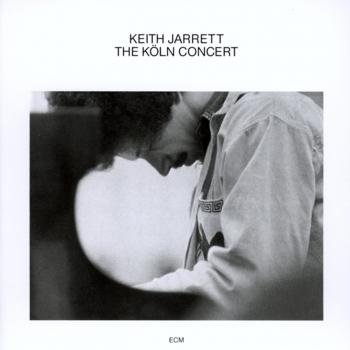
Concerts: Bregenz - München Keith Jarrett
Album info
Album-Release:
2013
HRA-Release:
06.11.2013
Album including Album cover Booklet (PDF)
I`m sorry!
Dear HIGHRESAUDIO Visitor,
due to territorial constraints and also different releases dates in each country you currently can`t purchase this album. We are updating our release dates twice a week. So, please feel free to check from time-to-time, if the album is available for your country.
We suggest, that you bookmark the album and use our Short List function.
Thank you for your understanding and patience.
Yours sincerely, HIGHRESAUDIO
- Bregenz, May 28, 1981
- 1Part I22:00
- 2Part II12:07
- 3Untitled24:22
- 4Heartland09:30
- München, June 2, 1981
- 5Part I23:23
- 6München, June 2, 1981 Pt. II24:22
- München, June 2, 1981
- 7Part III26:30
- 8Part IV11:44
- 9Mon Cœur Est Rouge08:30
- 10Heartland06:11
Info for Concerts: Bregenz - München
The Bregenz/Munich concerts were Jarrett’s most brilliant live solo recordings to date; his level of inspiration is quite extraordinary, and the music covers a wider musical and emotional range than ever.” – Jarrett biographer Ian Carr
After “Bremen/Lausanne” after “The Köln Concert”, after the epic “Sun Bear Concerts”, the next development in Jarrett’s solo concerts was the all-embracing music captured here. Two 1981 improvised concerts from Austria and Germany are featured, recorded respectively at the Festspielhaus Bregenz and the Herkulessaal Munich, venues noted for outstanding acoustics. While the Bregenz concert has hitherto been available as a single CD, this set marks the first appearance of the complete Munich performance on HighResAudio. The 3-album set includes extensive text booklet with liner notes by Keith Jarrett, an essay by Swiss critic Peter Rüedi, and poetry by Michael Krüger.
„Tapping his apparently inexhaustible mine, Jarrett continues to find deeper levels.” (International Herald Tribune)
“Jarrett’s masterful improvisations touch on two centuries of music history, from Bach to Debussy, and also command all the possibilities of jazz... An exceptional musician whose imagination is almost without limits, moving with perfect assurance between periods and styles, and boldly defying the borderlines of ‘serious’ and ‘popular’ idioms.” (Neue Zürcher Zeitung)
“This latest chapter of his prodigious output brings the Afro-American and European improvising traditions together, without effort and with complete conviction. It’s a remarkable tour-de-force which moves through the blues, Erik Satie, stride expressionism, bop and baroque.” (The Guardian)
Keith Jarrett, piano
Recorded May 28, 1981 in Festspielhaus Bregenz (Austria) and June 2, 1981 in Herkulessaal München (Germany)
Engineer: Martin Wieland
Produced by Manfred Eicher
Digitally remastered


 Keith Jarrett
Keith Jarrett
At the end of 2008, Keith Jarrett added two concerts to his schedule at short notice – one at Paris’s Salle Pleyel (November 26), one at London’s Royal Festival Hall (December 1) . The music on “Testament” is from these concerts. Their range is compendious, Jarrett’s improvisational imagination continually uncovering new forms, in a music stirred by powerful emotions. In his liner notes, the pianist is forthright about the personal circumstances promoting a need to lose himself in the work once more.
He also reminds the reader/listener that “it is not natural to sit at a piano, bring no material, clear your mind completely of musical ideas and play something that is of lasting value and brand new.” This, however, has been the history and substance of the solo concerts since Jarrett initiated them, almost forty years ago . Over time their connection to ‘jazz’ has often become tenuous, yet Jarrett’s solo concerts, with the foregrounding of melody and the continual building, and relinquishing, of structure, are also removed from “free improvisation” as a genre. Jarrett’s solo work is effectively its own idiom, and has been subject to periodic revisions by the pianist. “In the early part of this decade, I tried to bring the format back: starting from nothing and building a universe.”
Since the “Radiance” album and the “Tokyo Solo” DVD of 2002 Jarrett has been adjusting the flow of the work, more often working with shorter blocks of material. “I continued to find a wealth of music inside this open format, stopping whenever the music told me to.” This approach distinguished “The Carnegie Hall Concert” (2006), and it is most effectively deployed in “Testament” , where the strongly-contrasting elements of the sections of the Paris concert in particular have the logic of a spontaneously-composed suite. The nerves-bared London performance (the first UK solo show in 18 years) is different again: “The concert went on and, though the beginning was a dark, searching, multi-tonal melodic triumph, by the end it somehow became a throbbing, never-to-be-repeated pulsing rock band of a concert (unless it was a church service, in which case, Hallelujah!).”
In the end, the improviser does what must be done. As Keith Jarrett said, a long time ago, “If you’re a rock climber, once you’re halfway up the face of the cliff, you have to keep moving, you have to keep going somewhere. And that’s what I do, I find a way.”
These days, however, Jarrett is rationing the number of ascents: there have been less than thirty solo concerts in the last decade, making “Testament” a special event indeed. Two further solo performances are scheduled for 2009 – at the Palais des Beaux Arts in Brussels on October 9, and at Berlin’s Philharmonie on October 12.


























